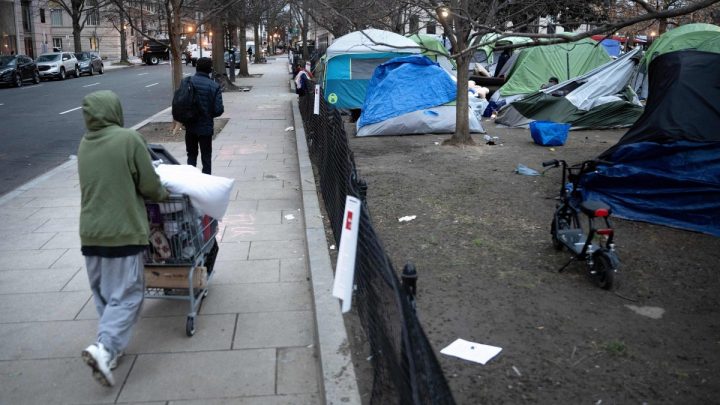
Biden plan to end homelessness is missing a crucial ingredient: more money
Biden plan to end homelessness is missing a crucial ingredient: more money

The Joe Biden administration has a plan that it says won’t just prevent homelessness, but will end it altogether. Its near-term goal is to reduce the number of unhoused people by 25% over the next couple of years. But here’s the catch: There isn’t a whole lot of new money in the plan. And getting people off the street is expensive.

Joseph White, 59, has lived in a government-subsidized apartment in downtown Washington, D.C., for four years. His share of the monthly rent is $300. The apartment is mostly furnished with stuff other tenants had thrown out, which White found next to the building’s dumpster.
That includes his couch, “that table, that desk, that printer,” White said, pointing to the furnishings in his living room.
White learned to be extraordinarily resourceful before he moved in, because he was homeless. White is an Army veteran. He left the service in 1994 and got hooked on crack shortly after that. He was only able to get clean after about 20 years when he had a roof over his head.
“It helped me a lot because I was able to start thinking about what I needed to do without worrying about what’s around me or who’s going to hurt me,” he explained.
This is the premise behind the Biden administration’s plan — a theory known as Housing First. The idea is to get an unhoused person housed, then tackle drug addiction, mental health and other issues.
Jeff Olivet is a big fan of Housing First. He’s the executive director of the U.S. Interagency Council on Homelessness, a federal agency.
In a conference room just a mile and a half from White’s apartment, Olivet said that, on average, it costs roughly $10,000 per year to get an unhoused person into a permanent home.
And the problem is widespread. “On any given night in the United States, more than 580,000 people are homeless,” he said.
Olivet added that Biden asked for more money in next year’s budget to tackle the issue, but Congress would have to approve that.
“I’m keenly aware of the political nature of how things get funded in Washington, D.C., and it’s a complicated situation right now,” he said with a sigh.
Charitable foundations and the private sector should pony up more money to help the homeless, Olivet said, as should cities and counties. But you need federal money on top of that to really make a dent in homelessness, according to Sarah Hunter, director of the Rand Center on Housing and Homelessness in Los Angeles.
“Every day, more and more people are falling into homelessness. So without new support, that will continue to occur, and it’s bad for everyone,” she explained.
Hunter is happy that the Biden administration is paying closer attention to homelessness. The plan does provide teams of federal workers to help communities cut through red tape to access existing programs.
But “there’s nothing really innovative or new about the plan,” she said — because that would cost money.
There’s a lot happening in the world. Through it all, Marketplace is here for you.
You rely on Marketplace to break down the world’s events and tell you how it affects you in a fact-based, approachable way. We rely on your financial support to keep making that possible.
Your donation today powers the independent journalism that you rely on. For just $5/month, you can help sustain Marketplace so we can keep reporting on the things that matter to you.












